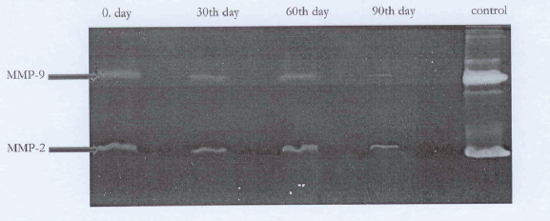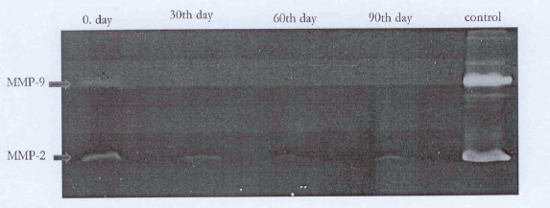Matrix Metalloproteinases 2 and 9 Activity after Intra-Articular Injection of an Autologous Plasma Rich Platelets for the Treatment of Osteoarthritis in Dogs
Introduction
Intra-articular injection of autologous plasma rich platelets (PRP) holds promise as a potential treatment for osteoarthritis in dogs. Matrix metalloproteinases (MMPs) are important enzymes for cartilage degradation.
Objectives
The purposes of the study was to determine the levels of MMP-2 and 9 in the synovial fluids after intra-articular injection of an autologous platelet concentrate for the treatment of osteoarthritis in dogs.
Methods
Twenty dogs were used as a materials. Twenty cc blood samples for each dogs was obtained by jugular vein. Double centrifuged method will be used to obtain platelet-rich plasma. First centrifuged 10 minutes 1000 rpm and second centrifuged 2000 rpm for 20 minutes. Arthrocentesis was performed as described for dogs in the treatment group. Radiographs of the affected joints obtained at weeks 0, 4, 8, 12 were examined. Gelatine zymograph was performed as described by Coughlan (1997).
Results
HVAS and CBPI were examined scores for all components were not significantly different between week 0, 4, 12 for control dogs. There was an increase in the activity of 70 kDa enzyme in pre-operative treatment synovial fluids samples. This was due to MMP-2 activity. Enzyme activity was seen at 204 kDa (MMP-9 pro-dimer) and 257 kDa (MMP-9 dimer). All two enzyme bands were inhibited after PRP treatment group (Figure 1) and there were no change in saline (0.9% NaCl) (Figure 2) injected group.
| Figure 1. Saline (0.9% NaCl) injected group | 
|
|
| |
| Figure 2. PRP injected group | 
|
|
| |
Conclusions
Plasma rich platelets is minimally invasive methods for the treatment of osteoarthritis in dogs. PRP suppress enzymes and this can reduce the signs and symptoms of inflammatory conditions.